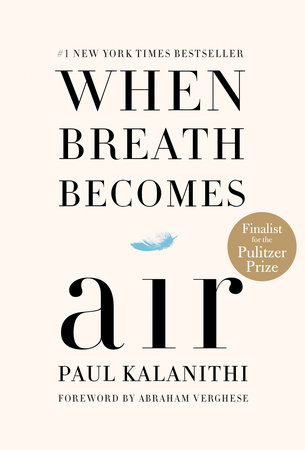When Breath Becomes Air Reader’s Guide
By Paul Kalanithi


1. How did you come away feeling, after reading this book? Upset? Inspired? Anxious? Less afraid?
2. What did you think of Paul’s exploration of the relationship between science and faith? As Paul wrote, “Science may provide the most useful way to organize empirical, reproducible data, but its power to do so is predicated on its inability to grasp the most central aspects of human life: hope, fear, love, hate, beauty, envy, honor, weakness, striving, suffering, virtue. Between these core passions and scientific theory, there will always be a gap. No system of thought can contain the fullness of human experience.” Do you agree?
3. How do you think the years Paul spent, tending to patients and training to be a neurosurgeon, affected the outlook he had on his own illness? When Paul wrote that the question he asked himself was not “why me,” but “why not me,” how did that strike you? Could you relate to it?
4. Paul had a strong background in the humanities, and read widely throughout his life. Only after getting a Master’s in English Literature did he decide that medicine was the right path for him. Do you think this made him a better doctor? A different kind of doctor? If so, how? How has reading influenced your life?
5. What did you think of Paul and Lucy’s decision to have a child, in the face of his illness? When Lucy asked him if he worried that having a child would make his death more painful, and Paul responded, “Wouldn’t it be great if it did,” how did that strike you? Do you agree that life should not be about avoiding suffering, but about creating meaning?
6. Were there passages or sentences that struck you as particularly profound or moving?
7. Given that Paul died before the book was finished, what are some of the questions you would have wanted to ask him if he were still here today?
8. Paul was determined to face death with integrity, and through his book, demystify it for people. Do you think he succeeded?
9. In Lucy’s epilogue, she writes that “what happened to Paul was tragic, but he was not a tragedy.” Did you come away feeling the same way?
10.
How did this book impact your thoughts about medical care? The patient-physician relationship? End of life care?
11. Is this a book you will continue thinking about, now that you are done? Do you find it having an impact on the way you go about your days?
12. Lucy also writes that, in some ways, Paul’s illness brought them closer – that she FELL feel even more deeply in love with the “beautiful , focused man” he became in the last year of his life. Did you find yourself seeing how that could happen?
Just for joining you’ll get personalized recommendations on your dashboard daily and features only for members.
Find Out More Join Now Sign In